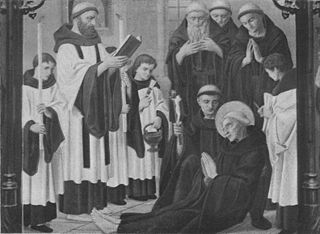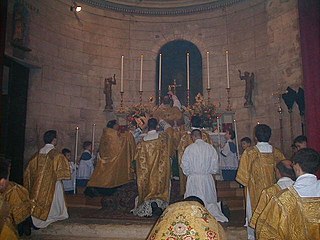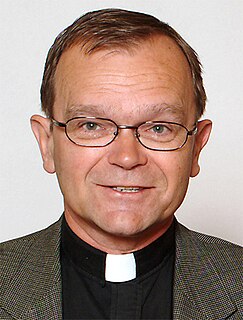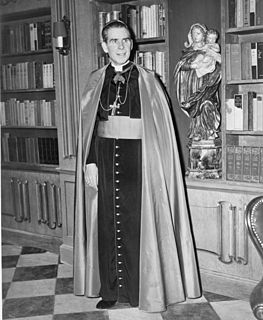
Clergy are formal leaders within established religions. Their roles and functions vary in different religious traditions, but usually involve presiding over specific rituals and teaching their religion's doctrines and practices. Some of the terms used for individual clergy are clergyman, clergywoman, and churchman. Less common terms are cleric, churchwoman, and clergyperson, while clerk in holy orders has a long history but is rarely used.

Louis René Édouard de Rohan known as Cardinal de Rohan, prince de Rohan-Guéméné, was a French bishop of Strasbourg, politician, cardinal of the Roman Catholic Church, and cadet of the Rohan family. His parents were Hercule Mériadec, Prince of Guéméné and Louise Gabrielle Julie de Rohan. He was born in Paris.
Defrocking, unfrocking, or laicization of clergy is the removal of their rights to exercise the functions of the ordained ministry. It may be grounded on criminal convictions, disciplinary problems, or disagreements over doctrine or dogma, but may also be done at their request for personal reasons, such as running for civil office, taking over a family business, declining health or old age, desire to marry against the rules for clergy in a particular church, or an unresolved dispute. The form of the procedure varies according to the Christian denomination concerned. The term defrocking implies forced laicization for misconduct, while laicization is a neutral term, applicable also when clergy have requested to be released from their ordination vows.
In the canon law of the Catholic Church, the loss of the clerical state is the removal of a bishop, priest or deacon from the status of being a member of the clergy.

A surplice is a liturgical vestment of the Western Christian Church. The surplice is in the form of a tunic of white linen or cotton fabric, reaching to the knees, with wide or moderately wide sleeves.

Vestments are liturgical garments and articles associated primarily with the Christian religion, especially among the Eastern Orthodox, Catholics, Anglicans, and Lutherans. Many other groups also make use of liturgical garments; this was a point of controversy in the Protestant Reformation and sometimes since, in particular during the Ritualist controversies in England in the 19th century.
A clerk is a white-collar worker who conducts general office tasks, or a worker who performs similar sales-related tasks in a retail environment. The responsibilities of clerical workers commonly include record keeping, filing, staffing service counters, screening callers, and other administrative tasks.
Clerical clothing is non-liturgical clothing worn exclusively by clergy. It is distinct from vestments in that it is not reserved specifically for services. Practices vary: is sometimes worn under vestments, and sometimes as the everyday clothing or street wear of a priest, minister, or other clergy member. In some cases, it can be similar or identical to the habit of a monk or nun.

Clericalism is the application of the formal, church-based, leadership or opinion of ordained clergy in matters of either the Church or broader political and sociocultural import.

A clerical collar, clergy collar, Roman collar or, informally, dog collar is an item of Christian clerical clothing. The collar closes at the back of the neck, presenting a seamless front. The shirt may have the collar built in. The clerical collar is almost always white and was originally made of cotton or linen but is now frequently made of plastic. Sometimes it is attached with a collaret or collarino that covers the white collar almost completely, except for a small white square at the base of the throat, and sometimes with the top edge of the collar exposed to mimic the collar of a cassock. It may simply be a detachable tab of white in the front of the clerical shirt. The clerical shirt is traditionally black, but today is available in a variety of colors depending on the wearer's preference. Once the clerical collar is removed the garment is indistinguishable from any other shirt. When clergy are delivering sermons, they sometimes attach preaching bands to their clerical collar.
A religious is, in the terminology of many Western Christian denominations, such as the Catholic Church, Lutheran Churches, and Anglican Communion, what in common language one would call a "monk" or "nun", as opposed to an ordained "priest". A religious may also be a priest if he has undergone ordination, but in general he is not.
In Shi'a Islam the guidance of clergy and keeping such a structure holds a great importance. The clergy structure depends on the branch of Shi'ism is being referred to.
The term secular clergy refers to deacons and priests who are not monastics or members of a religious institute. A diocesan priest is a Catholic, Anglican or Eastern Orthodox priest who commits themself to a certain geographical area and is ordained into the service of the citizens of a diocese, a church administrative region. That includes serving the everyday needs of the people in parishes, but their activities are not limited to that of their parish.
The cleric is one of the standard playable character class in the Dungeons & Dragons fantasy role-playing game. Clerics are versatile figures, both capable in combat and skilled in the use of divine magic (thaumaturgy). Clerics are powerful healers due to the large number of healing and curative magics available to them. With divinely-granted abilities over life or death, they are also able to repel or control undead creatures. Clerics also have specific 'domains' which usually align with the character's alignment and the god that cleric serves. Whether the cleric repels or controls undead is dependent on the cleric's alignment. It is the only class to be included in every version of Dungeons & Dragons without a name change.
Clerics regular are clerics who are members of a religious order under a rule of life (regular). Clerics regular differ from canons regular in that they devote themselves more to pastoral care, in place of an obligation to the praying of the Liturgy of the Hours in common, and have fewer observances in their rule of life.

The ferraiolo is a type of cape traditionally worn by clergy in the Roman Catholic Church on formal, non-liturgical occasions. It can be worn over the shoulders, or behind them, extends in length to the ankles, is tied in a bow by narrow strips of cloth at the front, and does not have any 'trim' or piping on it.
Crockford's Clerical Directory (Crockford) is the authoritative directory of Anglican clergy and churches in the United Kingdom and Ireland, containing details of English, Irish, Scottish and Irish benefices and churches, and biographies of around 26,000 clergy in those countries as well as the Church of England Diocese in Europe in other countries. It was first issued in 1858 by John Crockford, a London printer and publisher whose father – also named John – had been a Somerset schoolmaster.
A jester is a type of entertainer.

Gentry are "well-born, genteel and well-bred people" of high social class, especially in the past. Gentry, in its widest connotation, refers to people of good social position connected to landed estates, upper levels of the clergy, and "gentle" families of long descent who in some cases never obtained the official right to bear a coat of arms. The gentry largely consisted of landowners who could live entirely from rental income, or at least had a country estate; some were gentleman farmers. In the United Kingdom, the term gentry refers to the landed gentry, the majority of the land-owning social class who were typically armigerous, but did not have a peerage. The adjective "patrician" describes in comparison other analogous traditional social elite strata based in cities, such as free cities of Italy, and the free imperial cities of Germany, Switzerland, and the Hanseatic League.

Clergy is a 2018 Polish drama co-written and directed by Wojciech Smarzowski. The film stars Arkadiusz Jakubik, Robert Wieckiewicz and Jacek Braciak as three priests united by an event that almost took their lives.








